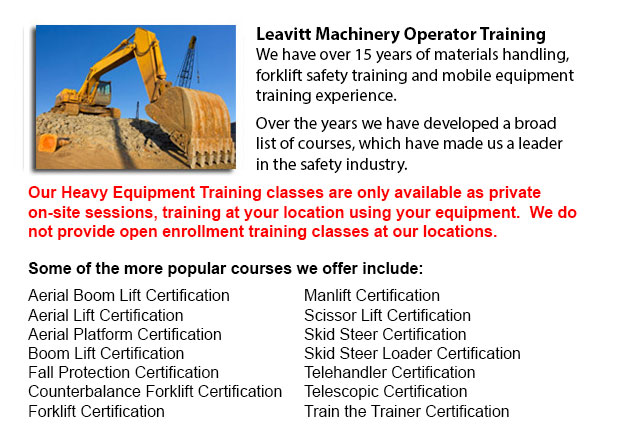
Heavy Equipment Training Courses Saskatoon - When choosing a heavy equipment operator course, the first step should be to determine the capacity in which you would be working with heavy machinery. You can find the best course to teach you how to operate the machinery or to fix these machines. Various choices are out there, be certain to align your career goals and your research so you could determine which classes would be right for you. It is vital to choose classes which are approved and recognized by the local governing bodies within your region.
The types of various heavy equipment certifications differ greatly. Nearly all operator training courses will be specific to the type of machinery you want to operate. Courses provided for crane operator certification will be different compared to the course provided for forklift certification. Crane certification would enable you to operate a crane safely, while the latter would enable you to handle various types of materials handling machinery. It is a good idea to check with your existing employer prior to enrolling in any classes in order to make sure that the ones you select will complete the training requirements your employer has planned for you.
Heavy Equipment Operator Training
The heavy equipment operator courses would help the operator in obtaining the required skills and knowledge they would require in order to enter the workforce as an entry level operator. In this twelve week course together with a practicum, you will focus on jobsite fundamentals such as: environmental, safety and health training and awareness, machinery operation and maintenance, and application of earth moving methods in hands-on conditions.
This training helps you to operate on selected things of machinery like for example a loader, compactor, dozer, grader and an excavator. There are various important skills required to become a heavy equipment operator: excellent problem solving skills, excellent oral communication skills, excellent spatial ability and excellent vision, physical stamina and strength, the ability to work well with others in a team or alone and good manual dexterity along with excellent eye-hand coordination.
Technical skills are likewise necessary to operate these machines. These skills include: being able to operate equipment and power tools, general mechanical ability, knowledge of safe working procedures, the ability to follow grade plans, technical specifications and read directions, the ability to make basic measurements and mathematical calculations, and the ability to carry out basic maintenance and mechanical repairs.
-
Scissor Lift Safety Training Saskatoon
Scissor Lift Safety Training Saskatoon - A scissor lift is a type of platform lift that moves vertically. The lift table is moved in a vertical motion because of criss-cross folding supports that are linked in what is called a pantograph. The platfor... More -
Crane License Saskatoon
Crane License Saskatoon - The operator of a crane has to have been certified with a crane operator license or certification. In order to practice as a crane operator, the credentials are considered mandatory. Licensing consists of training and final... More -
Order Picker Training Saskatoon
Order Picker Training Saskatoon - Order picker's allows warehouse staff to lift pallets making use of forks. Likewise known as a stock picker, this particular electrically-powered machinery is like a forklift except that an order picker is also made... More -
Scissor Lift Training Saskatoon
Scissor Lift Training Saskatoon - While operating a scissor lift, they have to be used competently so as to protect the wellbeing of the other employees inside the workplace and to protect the safety of the equipment. Skilled operators are trained to... More -
Telehandler Training Courses Saskatoon
Telehandler Training Courses Saskatoon - Employers are responsible for making certain that their operating personnel and supervisors are trained to work proficiently utilizing telehandler equipment. The skill level of employees need to be assessed. I... More -
Aerial Boom Lift Training Saskatoon
Aerial Boom Lift Training Saskatoon - For individuals who operate or supervise the use of aerial lift platforms, proper aerial boom lift Training is required. The aerial lift platform is for lifting people, tools and materials to elevated work locati... More -
Narrow Aisle Forklift / Order Picker Training / Electric Pallet Jack / Electric Pallet Truck Training in Saskatoon
A pallet jack is an appliance built especially for transporting pallets of differing weights and dimensions. They may be used in conjunction with cranes, forklifts and other heavy duty machinery as an attachment piece or to be used on their own. Pall... More -
Boom Lift Operator Training Saskatoon
Boom Lift Operator Training Saskatoon - A cherry picker refers to a type of aerial work platform. Cherry pickers include a bucket or platform at the hydraulic lifting system's end. The machine is also known as a man lift, boom lift, basket crane or h... More

Forklift Training Saskatoon
TOLL FREE: 1-888-254-6157
Saskatoon, Saskatchewan
forklifttrainingsaskatoon.com
Email Us
About Us



